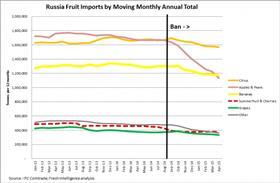
With the announcement by President Vladimir Putin on 25 June that Russia's ban on Western agricultural products will be extended for a further year, the fabric of trade flows of fresh fruit into Russia is likely to irrevocably change.
Russian importers will have to establish new longer-term trading relationships with suppliers outside the EU, and changes in Russian consumer demand patterns mean trade is unlikely to be able to pick up where it left off in 2014 once the ban is lifted.
Prior to Russia implementing the bans to agricultural imports in August 2014, imports of fresh fruit were around 6.1m tonnes per year worth ₽184bn (US$5.7bn).
In 12 months to end April, which included 9 months of the ban, imports had dipped 18 per cent to 4.9m tonnes, though with the declining value of the Russian currency the value increased 5 per cent to ₽194bn (US$4.2bn) on a monthly moving annual total measure. The value in euros declined 23 per cent to €3.4m in the same period.
In the 12 months prior to August 2014, Europe supplied around 1.4m tonnes of fresh fruit to Russia or 21 per cent. Other western countries banned including the US and Australia supplied less than 1 per cent each and too small to have had any impact.
The drop in overall volume is not as clear cut as dropping 1.2m tonnes as the depreciation of the rouble also contributed to lower volumes supplied from outside Europe.
Apples and pears were worst affected as Europe supplied 53 per cent of Russian apples and pear imports prior to August 2014. Apple and pear imports have declined 38 per cent or 445,000 tonnes.
Bananas were least affected by the ban since 97 per cent of Russia’s banana imports are supplied by Ecuador and most of the balance by Costa Rica and Philippines, however the trade is tracking 11 per cent or 100,000 tonnes lower which is more influenced by the rouble depreciation than the political landscape.
Similarly citrus has been less impacted with a 7 per cent decline in volume influenced by non-European factors. The EU supplied just 6 per cent or 100,000 tonnes of Russia’s citrus imports in 2014. Citrus from Morocco dipped 50 per cent to 148,000 tonnes and was offset by increased trade from Turkey and Egypt.
Grapes are tracking 12 per cent lower at 333,000 tonnes in 12 months to April 2015 and again are influenced by non-European factors since the EU supplied 33,000 tonnes or around 9 per cent of the grapes to Russia in 2014.
However, imports from China, which were expected to experience a large increase off the back of the ban, have increased just 2 per cent since August 2014 to 93,000 tonnes.



